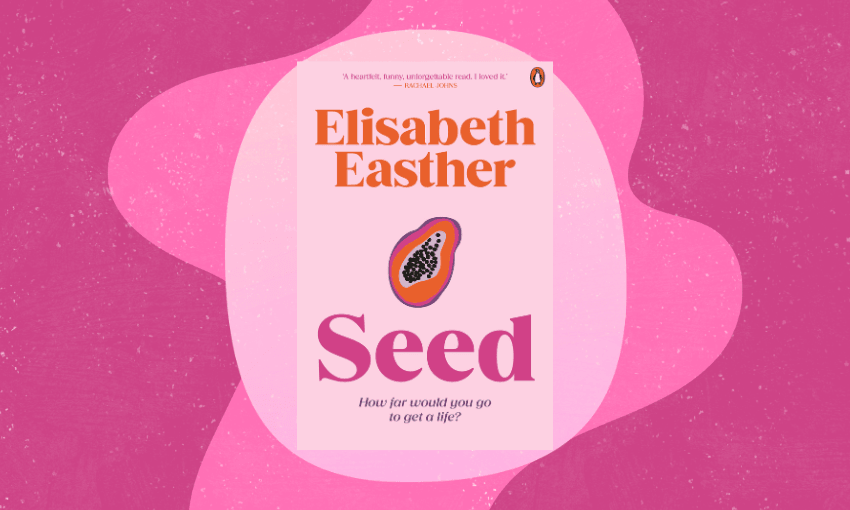The only published and available best-selling indie book chart in New Zealand is the top 10 sales list recorded every week at Unity Books’ stores in High St, Auckland, and Willis St, Wellington.
AUCKLAND
1 Sunrise on the Reaping by Suzanne Collins (Scholastic, $30)
More of that good Hunger Games stuff: this time, a prequel starring young Haymitch.
2 Careless People: A Story of Where I Used to Work by Sarah Wynn-Williams (Pan UK, $40)
“Sarah Wynn-Williams begins to get a sense that she isn’t in for a normal life when, at 13, she is munched by a shark.” So begins Julie Hill’s review of Careless People that you can read the rest of right here on The Spinoff.
3 The Let Them Theory by Mel Robbins (Hay House, $32)
The good people of Good Reads have typically mixed responses to this blockbuster of the self-help genre. Like this from Dr Linda Tucker: “The introduction is sufficient to grasp the concept. It’s not that compelling. Useful, yes. Worth a book? No.”
4 The Vegetarian by Han Kang (Portobello Books, $28)
Way back in 2015 Daniel Hahn wrote a review of this novel – the first of Kang’s to be translated into English – in The Guardian. Here’s a segment:
“The Vegetarian is a story in three acts: the first shows us Yeong-hye’s decision and her family’s reaction; the second focuses on her brother-in-law, an unsuccessful artist who becomes obsessed with her body; the third on In-hye, the manager of a cosmetics store, trying to find her own way of dealing with the fallout from the family collapse. Across the three parts, we are pressed up against a society’s most inflexible structures – expectations of behaviour, the workings of institutions – and we watch them fail one by one. The novel repeatedly shows the frictions between huge passion and chilling detachment, between desires that are fed and those that are denied. With such violence in these characters’ internal worlds, and such a maddening external impassiveness, those inner passions are bound to break out somehow, and it won’t be pretty.”
5 See How They Fall by Rachel Paris (Moa Press, $38)
A new crime novel from former lawyer Rachel Paris is about rot at the core of a dynastically wealthy family. Books editor Claire Mabey had a good chat to Paris about where the book came from, how she developed her characters, and why she set the story in Sydney.
6 Martyr! by Kaveh Akbar (Picador, $38)
Another poet turned novelist! Akbar is a phenomenal and generous writer and Martyr! was one of the most celebrated and talked about books from America last year. Here’s the opening of the review in The New Yorker:
“A novel with the title ‘Martyr!’ arrives on the scene preloaded and explosive. The word is fraught, even more so now than when the book’s author, the Iranian American poet Kaveh Akbar, chose it. There’s humor in the exclamation mark, but there’s something else, too. It signals that Akbar is fascinated with words in action, words that someone has reached for in a state of excitation, like joy or deep grief. The shouter of “Martyr!” bears something within him which he is determined to force the word to express. But the title’s punctuation ironizes or undercuts this intention, as if to suggest that language signifies in ways that are impossible to control. In Martyr! Akbar plays this struggle — the struggle to make words mean what you want them to mean — for laughs, but he’s also deadly serious.”
7 Becoming Supernatural by Joe Dispenza (Penguin, $37)
Just going to let the publisher’s blurb speak for this one:
“Becoming Supernatural marries some of the most profound scientific information with ancient spiritual wisdom to show how people like you and me can experience a more mystical life.
Readers will learn that we are, quite literally supernatural by nature if given the proper knowledge and instruction, and when we learn how to apply that information through various healing meditations, we should experience a greater expression of our creative abilities.
We have the capacity to tune in to frequencies beyond our material world and receive more orderly coherent streams of consciousness and energy; that we can intentionally change our brain chemistry to initiate profoundly mystical transcendental experiences; and how, if we do this enough times, we can develop the skill of creating a more efficient, balanced, healthy body, a more unlimited mind, and greater access to the quantum field and the realms of spiritual truth.”
8 Orbital by Samantha Harvey (Jonathan Cape, $26)
Last year’s starry Booker Prize winner.
9 Remarkably Bright Creatures by Shelby Van Pelt (Bloomsbury, $25)
That beautiful novel about a woman who makes friends with a giant Pacific octopus and they solve the mystery of her missing son.
10 Nesting by Roisin O’Donnell (Simon & Schuster, $40)
The latest from the renaissance that is happening in Irish fiction. Here’s the blurb:
“On a bright spring afternoon in Dublin, Ciara Fay makes a split-second decision that will change her life. Grabbing an armful of clothes from the washing line, Ciara straps her two young daughters into her car and drives away. Head spinning, all she knows for certain is that home is no longer safe.
It was meant to be an escape. But with dwindling savings, no job, and her family across the sea, Ciara finds herself adrift, facing a broken housing system and the voice of her own demons. As summer passes and winter closes in, she must navigate raising her children in a hotel room, searching for a new home and dealing with her husband Ryan’s relentless campaign to get her to come back.
Because leaving is one thing, but staying away is another.”
WELLINGTON
1 Sunrise on the Reaping by Suzanne Collins (Scholastic, $30)
2 Vividwater by Jacqueline Owens (Four Elements Press, $35)
Karen McMillan reviewed this new local dystopia over on NZ Booklovers. Here’s a snippet:
“Vividwater is set in Wellington and it perfectly imagines a future world that is sort of functioning like the corporate, office-based world we know at this time. In this future world, society hasn’t yet collapsed and people are still keeping up appearances, going to their offices if they still have work. But this is now a society where water is not just a way to stay alive. For those who have plenty, it is a sign of wealth and status.”
3 Careless People: A Story of Where I Used to Work by Sarah Wynn-Williams (Pan UK, $40)
4 Orbital by Samantha Harvey (Jonathan Cape, $26)
5 Without Fear of Favour: A Life in Law by Sir Kenneth Keith (Te Herenga Waka University Press, $70)
A handsome new book for anyone interested in New Zealand’s judicial system. Here’s the publisher’s blurb:
“Sir Kenneth Keith draws on the entirety of his illustrious career as a lawyer, teacher, judge and judicial reformer.
Without Fear or Favour begins with fundamentals: who does what and how, the sources of law nationally and internationally, constitutional principles and values, and time and the law.
Keith then moves on to consider the growth (and retreat) of the law, with chapters on the roles of international law in our constitutional and legal system, te Tiriti o Waitangi, bringing law to bear on governments, and protecting human rights.
Part three considers the law of negligence and piracy, the actions of public authorities, the disclosure and protection of information, the writing and reading of law, and litigating and judging.
Finally, Keith turns to the future. What roles will the legal academy, the law and lawyers play as we face the major challenges ahead?”
6 The Let Them Theory by Mel Robbins (Hay House, $32)
7 Dream Count by Chimamanda Ngozi Adichie (Fourth Estate, $38)
Adichie’s latest novel is being both celebrated and criticised in reviews so far. Alexandra Jacobs gives Dream Count a fulsome analysis in the NY Times. Here’s a chunk:
“Dream Count is innovative in its concentric form, more jotting than plotting, roaming flashbacks, nothing easily resolved. But there’s something faintly old-fashioned about its feminism, the better-off gals gathering to ‘swim in cocktails.’ Men tend to exist on a long sliding scale of badness — from good but boring, to desirable bounders, to sexist C.E.O.s and all the way to outright pillagers. Chia rejects a steady-seeming boyfriend, Chuka, though he’s great in bed, and longs for an emotionally absent, pretentious academic named Darnell, who talks about things like ‘the reification of the subjective neo-racial paradigm.'”
8 Ministry of Time by Kaliane Bradley (Sceptre, $28)
One of the blockbuster novels of 2024 and one that features in this year’s Auckland Writers Festival.
9 You Are Here by Whiti Hereaka & Peata Larkin (Massey University Press, $45)
A stunning collaboration between inventive writer Whiti Hereaka and visual artist Peata Larkin. Visit the publisher’s website for a peek.
10 Amma by Saraid de Silva (Hachette, $38)
Longlisted for the Women’s Prize (not shortlisted, but de Silva is a winner in our eyes) and the start of what promises to be a stellar writing career.



